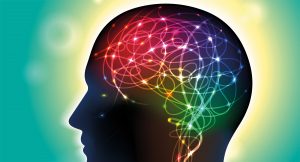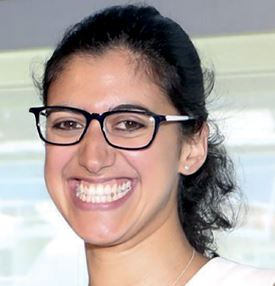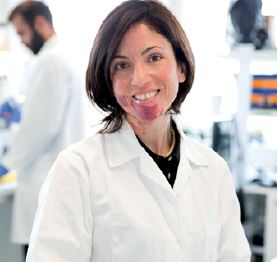A COVID-19 Silver Lining: Precision Medicine for Brain & Mental Health
 Did you know that nearly 17% of the Swiss population suffer from one or more mental disorders? And that more than 150’000 persons are currently living with dementia in Switzerland, with 30’000 more individuals who develop it every year? That’s a new sufferer every 18 minutes, and about two-thirds of the people affected by dementia are women.
Did you know that nearly 17% of the Swiss population suffer from one or more mental disorders? And that more than 150’000 persons are currently living with dementia in Switzerland, with 30’000 more individuals who develop it every year? That’s a new sufferer every 18 minutes, and about two-thirds of the people affected by dementia are women.
With COVID-19 still looming despite the distribution of vaccines, what has become clear is that this pandemic is not just about physical health. It has put brain and mental health in the spotlight, too.
That’s where the Women’s Brain Project comes in, and the reason why the 2020 International Forum on Women’s Brain and Mental Health (WBP Forum) was deemed a significant milestone on the path of sex and gender-oriented precision medicine as well as another step toward the realisation of the first Institute of Sex and Gender Precision Medicine in Switzerland.
The Impact on COVID-19 on Brain and Mental Health
The WBP Forum highlighted sex and gender differences in healthcare, and the importance of brain and mental health as the world struggles with lockdowns and quarantines.
“While our brains are wired to connect and belong, the need to be disconnected and often in isolation due to the pandemic is taking a significant toll in terms of sustained stress, which causes inflammation, a diminished immune response, and a greater susceptibility to other diseases,” stated Professor Eliot Sorel, Chair, Access to Care Committee, American Psychiatric Association, during his keynote address. “This may lead to an exacerbation of pre-existing mental disorders and new incidences of depression and anxiety, above all in the female population as they play a major caregiving role,” he added.
Combining Perspectives for Greater Insights
More than 200 people around the world registered for the WBP Forum held virtually on Sept. 19-20 last year, gathering scientists, academics, patients, caregivers, and policymakers, including Signe Ratso, European Commission Deputy Director General for Research and Innovation, and Dr Kaveeta Vasisht, Associate Commissioner for Women’s Health at the U.S. Food and Drug Administration (FDA).
Over the course of the two days, speakers discussed young suicide, maternal mental health, and sex and gender differences in dementia and Alzheimer’s Disease, in addition to calls to action for better migraine policies, lifestyle interventions, and new technologies for brain and mental health.
The red thread was “Sex and gender differences in brain and mental health across the lifespan: A gateway to precision medicine”.
The Role of Technology
Almost if not every panel included references to developing technologies and their potential positive impact on brain and mental health across the board. From apps that caregivers of young people who attempted or died from suicide to opportunities to detect post-partum depression or dementia more efficiently, it was clear that the way forward is to build on artificial intelligence (AI)-powered solutions.
Since 2016, WBP has been leading efforts to study the influence of sex and gender differences in mental and brain diseases with novel technology developments to foster diversity in precision medicine. Artificial intelligence (AI) is a great source of insights for scientific research and precision medicine, but it relies on large dataset bias, mainly European, and based on white men.
One of WBP’s objectives is to break the biases in precision medicine and to promote differentiated data to make clinical trials, drugs development, and health outcomes not discriminatory.
As summarised by Dr Engelberger, Health Councillor of the City of Basel, during his opening remarks at the WBP Forum, “I am sure that gender-specific medicine will become ever more important in the future. If women receive more targeted and efficient medical treatment, fewer resources will be wasted and costs will be reduced. This is important to all of us.”
The sustainability angle is not one often discussed in healthcare, but was the cornerstone of WBP’s co-founder and CEO, Dr Antonella Santuccione Chadha winning this year’s World Sustainability Award a week prior to the WBP Forum.
Looking to the Future: A Three-pronged Approach
Raising awareness about the aforementioned issues is key, but so is having a solutions-oriented approach. That’s why WBP is spearheading a number of initiatives to translate the insights of their Forum into action.
First, WBP launched the Swiss edition of the global “Be Brain Powerful®” campaign, with the support of various partners and sponsors. Available in English, German, Italian, and French, the campaign is built around the seven pillars of brain health. Individuals can sign up to a 30-Day Brain Health Challenge by email, and while the primary focus is on women’s brain health, a majority of the challenges are relevant to both men and women.
Second, the WBP Hackathon took place in January and February 2021 with participants from all over the world. The goal of the hackathon was to advance the understanding of sex and gender differences and leverage them for improved solutions, through teamwork and innovation. The topics included gender bias in ADHD, maternal mental health and organ-on-a-chip technology.
Last but not least, by hosting a regulatory roundtable, WBP is working with policy-focused organisations to better understand and catalyse ways in which sex and gender differences can be integrated in to research guidelines and requirements including an emphasis on sex and gender disaggregated data as well as clinical trials and more.
As the world struggles to identify what the “new normal” is, organisations like the Women’s Brain Project are also reshaping reality with the goal of leveraging precision medicine to offer a more effective, equitable, affordable healthcare to all.
About the Authors

Author: Shahnaz Radjy
Shahnaz Radjy is a member of the Women’s Brain Project Executive Committee and holds an MBA in Healthcare Management from the EHESP as well as a Bachelor of Arts in Biology from the University of Pennsylvania. She worked for ten years in chronic disease prevention and workplace health both at the World Economic Forum in Geneva, Switzerland, and the Vitality Institute in New York, USA. Shahnaz is now based in rural Portugal where she runs the Casa Beatrix ecotourism project while working as a freelance science communication consultant and writer. You can follow her on Twitter under @sradjy.

Author: Maria Teresa Ferretti
Maria Teresa is a neuroimmunologist with over a decade of international experience in the field of Alzheimer’s disease. She is the co-founder and Chief Scientific Officer of the Women’s Brain Project.
After a master in Pharmaceutical Chemistry in 2005 (University of Cagliari, Italy), she obtained a PhD in Pharmacology and Therapeutics at McGill University (Montreal, Canada) in 2011. That same year, she started as postdoctoral fellow in the Nitsch’s lab (University of Zurich, Switzerland), where in 2014 she became a group leader. In her research, Maria Teresa aims to identify novel biomarkers for improved individual level prediction of cognitive decline and Alzheimer’s.
You may have an interest in also reading…
The AI Economy Demands Leadership: Why Every C-Suite Needs a Chief AI Officer
By 2025, 35% of large organizations will have a Chief AI Officer (CAIO) reporting directly to the CEO or COO
Ann Low, US Department of State: Good Corporate Governance is Good Business
OECD Guidelines on Corporate Governance of State-Owned Enterprises. Over the past decade, cross-border trade and investment by state-owned enterprises (SOEs)
RegTech to the Rescue
The banking and other parts of the financial services industry are undergoing an all-encompassing digital transformation. Soon, disruptive technologies will


















































































